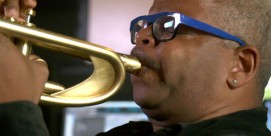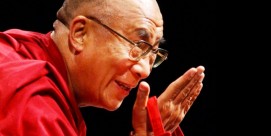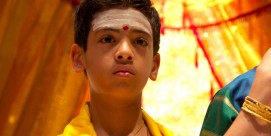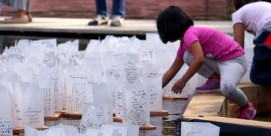In This Episode << SLIDE LEFT TO SEE ADDITIONAL SEGMENTS
Diana Eck Extended Interview
Read more of Bob Abernethy’s interview with Diana Eck:
Q: You begin A NEW RELIGIOUS AMERICA by saying that, without many of us noticing it, there’s been a huge change in the religious landscape in this country in the last generation or so. Describe that change.
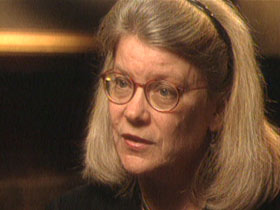
A: Well, I could describe it in a couple of ways, but maybe the way that is most easily apprehensible is the actual physical landscape. Now, if you drive down the interstate outside Toledo, you might see a huge mosque rising from the farmlands. Or, if you head out into the suburbs of Houston, you would see mosques and Hindu temples. If you turn off the little road on which the Boston Marathon starts outside Boston, there’s a sign that points to the Hindu Temple of New England.
So there’s a way in which the physical landscape of our country has changed with the new immigration that has brought people of all different cultures and nationalities from all over the world, with their religious traditions, to the United States.
Q: And the result of that diversity has been what?
A: Remarkable. I mean, if we were to look at what the religious landscape figuratively and architecturally looks like today, as opposed to 30 years ago, we have extensive Buddhist traditions, [with] places like Los Angeles now really the most complex Buddhist city in the entire world. We have Hindus who have come not just from India but from Trinidad and the Caribbean. We have Muslims who have come from the Middle East and from India and Pakistan and Africa and Indonesia. We have people of other South Asian religious traditions.
Q: And what has happened in this country as a result?
A: Well, in simple terms, we have become the most religiously diverse nation on earth. I believe that. People will say, “Well, look at India. Look at Canada. Look at Britain.” But if you REALLY look at it, if you add to the tremendous religious diversity of India all of the Southeast Asian, East Asian, and Latin American, Hispanic, Latino traditions; if you add to the vibrancy of the religious traditions of a place like Britain today, which is also multireligious, all that we have gained from both East and Southeast Asia and South America, you have something MUCH more complex than we see in any other part of the world.
Q: The absolute number of Muslims and Buddhists and Hindus and others is still really very small as a percentage of the whole. Why, then, is the change so important?
A: Well, I think it’s important in a number of ways. First, the Muslim population, though small as a percentage of the whole, is now just about on a parity with the Jewish population. And we know how important that is as a significant minority, a visible minority, in the United States. The other thing is that I believe EVERY community begins to change in its texture and its structure when the Protestant and Catholic churches and the synagogues are joined by even one or two Hindu temples, by a gurdwara. I’m thinking of Oklahoma City, for example: six or seven mosques, a couple of Hindu temples, a Jain temple, a Sikh gurdwara. That really changes the landscape for everyone.
Q: Why have you written that this is as difficult a challenge for America as race?
A: Well, because I think that religion in one way does not yield to or submit to the kind of ethnic, racial, and cultural melting pot forces that we have seen in the past. Religions don’t melt with quite the same, you might say, generational, submissive nature. It is really true that we begin to recognize a kind of diversity that is marked by religion in ways that are not quite as rigid when we look at race.
Q: Many Americans still use the language of a “Christian nation” to describe the way we are — maybe not exclusively so in numbers, but as far as the dominant culture is concerned. What does the new diversity do to that idea?
A: Well, I think we’re not in any constitutional sense a Christian nation. There is a way in which Christian values actually shaped the constitutional structure of our country. And one of those was the value placed on freedom of conscience and freedom of religion. The First Amendment really looked at the importance of there not being an establishment of religion, as so many Christian immigrants had known in other parts of the world, and there being free exercise of religion, free exercise of conscience.
Now, in some ways, these DID come out of the Christian values of our founders, but they really protect that same kind of free exercise for EVERYONE. As James Madison put it in his “Memorial and Remonstrance,” we can’t insist on that freedom of conscience for ourselves without recognizing that same freedom for people who haven’t seen fit to see the truth as we’ve seen it. So there IS a way in which this new diversity really tests us to make good on the foundational constitutional values of our country.
Q: In our history, there has been a great deal of intolerance — violence toward the newcomer who was different. How serious a problem do you think the hate crimes against these new immigrants have been?
A: I think it’s a serious problem wherever it occurs. Certainly, if you’re a Muslim whose mosque has been attacked by arson in Minneapolis, for example, it is a very serious problem.
But the response to that problem has displayed a kind of generosity and hospitality, even an interreligious cooperation, that is really the more important side of the story. Bricks [are] thrown through the windows of a new mosque in Illinois, for example, and within a few days, the entire interfaith community in Chicago comes together to carry these rubble bricks out of the mosque in an expression of solidarity. It’s THAT side of it that I think is very important.
Q: If there should be a severe economic recession, would you expect to see a lot more of these hate crimes?
A: I don’t think so. I don’t think that most of them are economically motivated. There have been some instances in which people fear the foreign because they fear the foreigners are taking jobs. But on the whole, I think they’re simply expressions of a kind of fear of difference that is NOT economically motivated.
Q: Where do you think the majority of Americans will see the effects of this new immigration the most? I’m thinking about zoning issues and workplace stress issues and things like that. Where do the cultures come together?
A: I would say probably the first and most important [place] is in our public schools. The children in our public schools are going to school with people of many different cultures. They’re speaking many different languages and bringing to school with them many different religious backgrounds. And so it’s in the schools, in the PTAs that people are likely to find this new religious America — where the rubber hits the road.
The workplace, of course, is also very important. Statistics in the 1990s have shown that the number of instances of discrimination in the workplace have risen dramatically.
Q: We talk about diversity. We talk about pluralism. We use the words interchangeably. What does “pluralism” mean to you?
A: Pluralism really means what we do with all the diversity that is ours, how we engage with it, IF we engage with it. It means not just the ghettoization of diversity: here we all are, and we’re all different from one another. But it means ENGAGING with that in some way. And that may be the engagement of parents of different children in the public schools. It may be the engagement of an interfaith council. It may be the engagement of an employer with the new diversity of the workplace. But it means ADDRESSING diversity, trying to build the bridges of communication and traffic that enable our diversity to build relationships.
Q: Why should we do that? Why not just say, “Okay. If you want to worship that way, go ahead and worship that way. I leave you alone, you leave me alone.”
A: We DO encounter one another. That really is the issue. We live in the United States today in such close quarters with religious diversity that we really need to understand more of who we are when we say, “We, the people of the United States.” That’s a pretty big statement, and we need to be able to have some sense of who these neighbors are.
The hate crimes that you mentioned, for example, are mostly generated out of the kind of half-baked, tolerant truths that we carry around with us in our heads. And I think that to break down some of the stereotyping and walls of misunderstanding, we actually need more relationship than we have.
Q: Let’s say that we all got into dialogue with each other and, as a result of that dialogue, we discover — as I think we probably would — just how different we are, different in some very fundamental beliefs, such as who Jesus was. Could the dialogue that comes out of this effort to cope with pluralism — could that, in fact, lead to more difficulty in relations, rather than less?
A: I don’t think so. I think the most precious thing that people of different religious traditions have in common is a clear understanding of their differences. It’s OKAY if we’re not all the same. And, in fact, the building of relationship and coming to a clear understanding of who the other is may make us understand OURSELVES more deeply.
Q: But what does that mean for the idea of truth? I am committed to certain truths. You are committed to certain truths. If my neighbor has a commitment to something that is fundamentally different from mine, how do I relate to that? A: Muslims will often say, “God has made us into many races and families and tribes so that we may KNOW each other.” But that difference is not a threat to us. Difference is an opportunity for UNDERSTANDING.
It may be that we hold VERY different truth claims. But one of the things that’s important in the United States, I believe, is to be able to make a distinction between our theological beliefs — our religious beliefs — and the things that knit us together as a nation — our civic beliefs and values, if you will. And our CIVIC beliefs are premised on the free exercise and the nonestablishment of religion. And we protect that for EVERYONE, whether we agree with them theologically or not.
Q: Many Christians — evangelical Christians, especially — feel not just a duty but a real commission by Jesus himself to evangelize non-Christians, to try to preach to them and convert them. In this new America of many religions, what do you say to people who feel this deep, deep obligation to convert others?
A: One of the most important things to say is that the obligation of a Christian is not only [to] witness to people of another religious tradition but to listen to whatever witness they may have. And once you are speaking and listening, you’re already in dialogue.
I think the thing that many people who are not Christians feel about Christian evangelism and mission is that it’s so one-way; it’s so one-sided. It is all mouth, you might say, and no ears. As a Christian, I would say that’s a wrong understanding of what kind of relationship we should have with people of other faiths.
But I think we also need to see clearly the ways in which WE are perceived by others. Having Hindu and Muslim and Buddhist neighbors enables us to hold a mirror up to ourselves, as well.
Q: Do you think, in this new situation, that Christians in this country should stop trying to proselytize others?
A: I think there are appropriate places for proselytizing or for mission, but there are also inappropriate places. That doesn’t mean that we should stop evangelizing either here or elsewhere, but it DOES mean that the attitude of relationship we need to have with neighbors of other faiths is something that requires a real seeking of dialogue and not the one-way process of mission.
Q: What is an evangelical Christian, for instance, supposed to do about such scriptural language as, “I am the way, the truth and the light” — that “Nobody comes to the Father, except through me”? That’s pretty exclusive. What is somebody supposed to do about that?
A: I think the problem with that sentence is, [in] the first place, it’s torn right out of the context of Scripture. It was never intended to mean, “I am the way, and when Mohammed comes in 700 years, people will have nothing of the word of God through him,” or, “I am the way, and Hindus and Buddhists have seen nothing of the way of truth and righteousness and inner light.”
That’s not what it meant. It is a pastoral statement of Jesus on the night before he died to his disciples. To attempt to make it the answer to any kind of questions we might want to ask about theological truth does violence to that Scripture.
Q: You spoke about listening, as well as speaking. What are the most important things Christians can learn from Muslims and Buddhists and Hindus and others?
A: The most important thing that we can learn FROM people of other religions is ABOUT people of other religions — to develop relationships with them as neighbors and as citizens.
One of the other things I would say, however, is that hospitality is one thing that people of many of these religious communities in the United States have developed to a high art. And I say that from personal experience, having dropped into a Sikh gurdwara in Freemont, California or in some part of New Jersey and found that just about any time of the day I would be welcomed, I would be given a meal, I would have people to talk to who would tell me about their faith. There’s a kind of hospitality that comes with some of these religious traditions that is really wonderful. And it often makes me think about what the stranger who dropped into my United Methodist church might feel on a Sunday morning.
Q: What can non-Christians learn from Christians?
A: Because this society has been shaped by freedom and democracy and a kind of voluntary spirit that came from our constitutional framework, there is a way in which the energy of America’s voluntary religious communities — many of which are Christian — has really begun to rub off in the religious communities that have come here.
Q: It’s hard to remember a time in history when there has been a society as religiously diverse as this that has been peaceful. Has anybody ever achieved this kind of mutual respect that we need to achieve now?
A: There have been periods in the multireligious history of many parts of the world in which people have managed to live together peacefully. Now, there are people who would say the most effective form of a pluralistic society, the most effective government, can only be totalitarian, in which there really is a very strong state to keep all the diversity, all of the ethnic or religious elements in balance.
We have this challenge in the United States to do something that has really NEVER been done before, which is to create a multireligious and democratic state. And, in fact, the multireligious America is an EXTENSION of our commitment to a constitutional democracy. And we have an opportunity to create such a state in a world that has very few models for this kind of religious pluralism.
Q: Would it be fair to say that the way to do that is not so much through discussions of theology as it is through personal contact?
A: Absolutely. There are many ways in which people come together creating an interfaith public square, you might say. Some of it is through the personal contact — the interfaith dialogue that is right there in the workplace at the water fountain — and some of it is in the school, and some of it is in other civic arenas. But it really is personal contact that makes the difference.
Q: How would you rate the chances of success — of our achieving what nobody else has done?
A: I rank them pretty high. We have a society that is very committed to a kind of neighborliness, maybe over and above everything. And when we look at the way in which this has been expressed in the United States, even despite the new challenges of the last 30 years, I think we’re looking at a very optimistic scene, indeed.
Q: How should Christians and Jews and others relate to Buddhists, who do not believe in a transcendent god?
A: The problem is continually wondering how CHRISTIANS are going to deal with all of these things. Part of the problem is that most Christians in the United States are pretty abysmally ignorant about the religious traditions of the rest of the world.
The first thing that Christians need to do is to get out there and UNDERSTAND what it means for a vibrant religious tradition that has transformed the whole of Asia and now is beginning to transform America — what it MEANS for a vibrant religious tradition not to use the symbol “god” in the way we do.
I think Christians have a VERY steep learning curve in the United States and have to learn a lot more about the religious traditions of the rest of the world.
Q: And what about Hindus, with — I don’t know — 330 million deities?
A: That’s right.
Q: How do they interpret that?
A: Well, they need to ask Hindus how THEY interpret it, because there’s a way in which the Hindu tradition was made for the American project. “E pluribus unum” is our national motto. And, in a way, “Out of many, one” is also the theological motto, you might say, of the HINDU tradition. Go into a Hindu temple, in Livermore, California, for example, and you’ll see lots of shrines to different names and forms of God. But almost every Hindu will say, “In name and form there are many, but we also believe in one god. We have many names, many attributes, many ways of seeing the divine. In fact, the ways of seeing the divine are limited not by God’s capacity to be present, but by our human capacity to SEE.”
So open your EYES. Let’s try to understand what it MEANS to speak of the “many-ness” of God. And Hindus can really help us with that.
Q: You yourself have been on the same path that you recommend for all the rest of us. How has this knowledge that you’ve gained about so many other religions strengthened you?
A: It certainly has strengthened the relationships that hold me in place in life. Hindu teachers, dear Buddhist friends, Muslim co-workers and colleagues — all of them are part of the nourishing family that I stand in the midst of. In my own faith, it’s made me much clearer about the great mystery that is the divine truth, and the humility that all of us need to comport ourselves with if we’re to understand that. We’re not in the position of being the judges of others, nor in the position of being able to fully understand what, as we would put it, “God is up to” in the world. And I think our Hindu and Buddhist and Sikh and Muslim neighbors help us along that path of understanding.
Q: In the dialogue that you hope will develop, what do you think are the most important things that the non-Christian religions can learn from American Christians?
A: I think one of the things that is most important about the United States is the cherishing of religious freedom. People have come to the United States from all over the world with the notion that religious freedom is something that this country supports. Muslims are grateful for that. People who have come from parts of the world where religious freedom is not allowed are grateful for that. That IS something that the United States has to contribute as a supportive environment to these new religious communities.
One of the things that interests me most is that in recent polling that has been done among Muslims in America, more than 70 percent think it’s very important for Muslims to participate in the American political process. That means the kind of engagement that we hope for from citizens is now a real value in the Muslim community as well. And certainly the last few years have seen this play itself out.
Q: I’m mindful of Christians who feel threatened by people who are NOT Christians, by people who believe very deeply in different ideas about God. What do you say to a devout evangelical Christian who feels that there is something about the new religious America that challenges the truth of Christianity?
A: Well, I would say they need to be able to open their minds to the truth of CHRISTIANITY, then. One of the most startling things about the entire experience of Easter and the Pentecost was that most of the people who came to call themselves Christians didn’t recognize what Christ was doing, didn’t recognize him when he was walking along the road side by side with them, didn’t recognize him when he was standing on the bank of the lake, didn’t recognize the outpouring of the Holy Spirit.
I mean, these mysteries are things that the Christian church does not have locked up in its own treasure chest, but are mysteries that we need to be alert to. And I fully believe that people who have a very tidy view of Christianity, as if all the mysteries have been solved, need to open their eyes AGAIN to “what God is DOING in the world,” as some of us might put it.
Many things that I talk about in A NEW RELIGIOUS AMERICA are really lessons for Christians from our neighbors of other faiths. One of the stories I tell toward the end is of a Vietnamese Buddhist temple in Boston, in the suburb of Roslindale, where the magnificent image outside of the bodhisattva of compassion, named Kuan-yin, was smashed by neighborhood vandals — boys in the projects next door — out of some of the same kind of fear that you mentioned.
And in the course of deciding what to do when the vandals were caught, the Vietnamese Buddhists set an example of forgiveness for the whole city. They refused to bring the boys to court. They invited the entire neighborhood to a kind of festival of forgiveness. They had a picnic. They had a neighborhood cleanup. Catholics from the neighborhood parish and people from all over Roslindale were participating in this. They invited the vandals. And the boys went in and saw what happened in the temple, saw people at prayer.
I remember talking with one of them. His name was Angelo. And the president of the temple, when he welcomed Angelo and embraced him, had said, “Your name means ‘angel’ — a guardian angel. And we’re going to make you the guardian angel of this Vietnamese Buddhist temple.” They basically displayed the kind of ethic of love and forgiveness that most Christian churches would CHERISH.
Christians need to recognize across the board that the Christian church does not have a corner on compassion and love and the virtues that are called in Saint Paul’s letter to the Galatians the “fruits of the spirit.” These are things that are widely shared, and we need to keep our eyes open for them — WHEREVER we find them.
When I talked to Angelo a little later, he said, “You know, if I had known ANYTHING about what went on inside this temple and about these people, I would never have DONE this.” And that’s a lesson for all of us.



